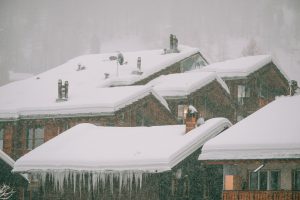During winter, condensation on double glazed windows can be a bothersome issue for homeowners. It not only detracts from the aesthetics but can also cause mold growth and window damage over time.
Fortunately, there are various practical solutions to prevent condensation from forming on double glazed windows during winter. By taking some simple steps, you can ensure that your windows remain dry and clear throughout the winter season.
How can I lessen the condensation on my double glazing in the winter?
Condensation is a common issue on double glazed windows, particularly in winter. It’s important to understand the various types of condensation and their underlying causes to determine whether it’s a cause for concern.
When you observe condensation on the exterior of your windows, it’s an indicator that your double glazing is performing as intended. It’s due to the outside temperature being warmer than the windows, which prevents heat transfer. Although it may not be aesthetically pleasing, it usually goes away by itself once the sun emerges.
Condensation on the interior of your double glazing, on the other hand, may indicate excessive humidity levels in your home.
It occurs naturally when water vapor comes into contact with a colder surface, but excess moisture in the air can lead to harm to your property and health.

To minimize condensation, you can enhance ventilation by opening doors and windows, drying laundry outside, and using night vent facilities.
When condensation occurs between the panes of your double glazed windows, it suggests that your windows are malfunctioning. This occurs when the seal holding the insulating gas between the two panes of glass breaks, allowing moisture to enter.
This causes energy waste and potential damage to your property, indicating a need to replace the windows.
To decrease condensation, maintaining proper ventilation and temperature control in your home is crucial. Additionally, ensure that your windows are in good working order, and if you detect any condensation between the panes, it’s time to consider replacing your windows.
Why do I get so much condensation on the inside of my double glazed windows?
If you have double or triple glazed windows, and you notice condensation between the panes of glass inside the glazed unit, it means that the seals have failed.
It is worth noting that double glazed units naturally hold a low level of moisture internally.
However, the presence of condensation between the panes suggests that your windows are no longer functioning properly. This can result in wasted energy and potential damage to your home.
To maintain a comfortable living environment and improve the energy efficiency of your home, it is essential to replace any faulty glazed units promptly.
How do you stop condensation on double glazed windows overnight?
To avoid condensation on your windows during the night, you can take several steps. One straightforward approach is to keep your bedroom door open, which can enhance airflow and prevent moisture buildup.
Additionally, opening your curtains or using thinner ones can help promote better air circulation and reduce moisture.
If these strategies are not effective, it may be necessary to inspect your windows’ seals for damage or wear. Using a dehumidifier at night can also be an effective way to reduce excess moisture in the air and prevent condensation on your windows.
By taking these measures, you can maintain a comfortable and dry living environment while safeguarding your home from potential harm.
How can I stop condensation on my windows in winter?
Condensation is the process of water vapour in the air turning into water droplets when it comes into contact with a cold surface, such as windows or walls.
It forms because warm air, which holds more moisture than cold air, hits a colder surface and releases its moisture as water droplets. Condensation is most common in autumn and winter when surfaces inside the home are often cooler than the air temperature.

The warm air that contributes to condensation forming can come from cooking, taking baths and showers, boiling a kettle, using a tumble dryer or washing machine, drying clothes inside, and even breathing at night.
The amount of moisture in the air, the air temperature inside your home, and the temperature of surfaces like windows and walls also affect whether condensation forms in your home.
Quick Fixes for condensation on double glazed windows in winter
To prevent the formation of mold, it is important to address condensation on windows promptly. The easiest way to clear condensation from windows is by using a dry cloth or tissue, or a window vacuum.
However, it is essential to ensure that your home is adequately heated and ventilated to prevent the reoccurrence of condensation.
Additionally, it is advisable to minimize the amount of moist air produced by activities such as cooking and bathing.
It is crucial to note that damp on walls or other surfaces in your home can result from other more severe issues, such as rising and penetrating damp.

Rising damp occurs when moisture rises through the walls of a building, which can result in significant structural damage if left unaddressed.
Signs of rising damp include blistering paint, staining of wall coverings, and a musty odor. On the other hand, penetrating damp occurs when rainwater fails to evaporate from external walls and enters a building.
This can cause issues with timber work, including dry and wet rot, and black mold, which can have health implications.
Signs of penetrating damp include damp patches on walls or ceilings, wet and crumbly plaster, and the presence of spores or black mold.
Can you dry condensation out of double glazing?
You can dry condensation out of double glazing by using a dehumidifier. Typically used in bathrooms and kitchens to lower humidity, dehumidifiers can also be placed in front of affected windows to absorb the condensation present between the glass panes.
Leave the dehumidifier on for some time and it should gradually extract the moisture, minimizing or removing the condensation.
Does vinegar stop condensation on windows?
Yes, vinegar can help remove condensation on windows. To create a homemade solution, combine two cups of water and two cups of white vinegar with a few drops of dish soap. Use this mixture to wipe down the affected windows and clear the condensation.
However, it’s important to address any underlying issues causing the excess moisture, such as poor ventilation or high humidity levels, as vinegar alone may not prevent future condensation.
Does salt stop condensation on windows?
Salt can be a helpful solution for reducing condensation on windows by removing excess moisture from the air.
Due to its ability to adsorb moisture, salt can prevent moisture from turning into condensation.

You can place salt in a container or cloth bag and leave it near the affected windows to reduce the amount of condensation that forms.
However, it is important to keep in mind that while salt can be effective, it may not completely eliminate condensation, and addressing underlying issues such as poor ventilation is still necessary for effectively managing condensation.
Conclusion
There are several effective solutions to stop condensation on double glazed windows in winter. By improving ventilation, investing in a dehumidifier, or upgrading to special coated windows, you can ensure that your windows remain clear and dry throughout the winter months.
So, don’t let condensation ruin the appearance of your windows and potentially cause long-term damage – take action today and enjoy clear, dry windows all winter long!







